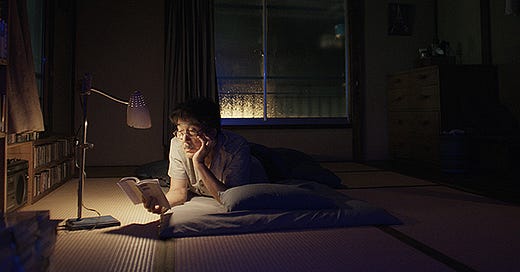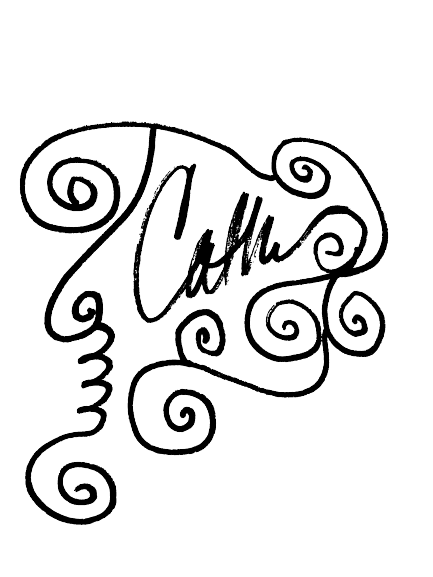Perfect Days: Now Is Now
Wim Wenders, that grand cinematic wizard, has blessed us with another miraculous film in his actually perfect "Perfect Days." And watching it is the perfect way to spend your Oscar Sunday morning.
Good morning and Happy Oscar Sunday to all who celebrate.
If you’re not heading out to mark the day with communal worship somewhere inside or while rambling in nature on this fine morn, might I make a suggestion?
Set aside two quiet hours alone or with someone you love, make a pot of tea, and stream Perfect Days, the new Wim Wenders film that you probably haven’t seen yet and very much should see as soon as humanly possible.
(It’s still in a few theaters and if you can catch it on the big screen as it was meant to be seen, please allow yourself that grace. You can find theater showtimes here.)
The Japanese language film set in Tokyo and directed by Wenders, the German auteur who gifted the world with Wings of Desire in 1987 and many other superb cinematic works, is nominated for the Academy Award for Best International Feature Film.
If the arc of the moral universe continues to bend toward justice, it should bring home the Oscar this evening.
Because Perfect Days is, to my eye and heart, as close to a perfect film as I have seen.
Ever.
It is, in a word, a masterpiece.
Or in two words: a quiet masterpiece.
🚨SPOILER ALERT! SPOILER ALERT! SPOILER ALERT! SPOILER ALERT!🚨
Please watch the film first if you can before reading on as there are plenty of spoilers ahead. That said, I don’t think anything I say here could spoil this film for you. It’s un-spoil-able. It is exquisite. Transcendent. It will change you. It has changed me. But, if you like a blank slate (or as close to that as one can get in this digital age of full information assault), before you experience a film, this is your chance to pause and come back.
As always, we’ll wait…
🚨SPOILER ALERT! SPOILER ALERT! SPOILER ALERT! SPOILER ALERT!🚨
Welcome back.
Don’t forget your tea (or your can of Suntory BOSS café au lait if you can find one.)
The Year of Our Lord MMXXIII delivered an embarrassment of riches in the world of cinema. I can scarcely remember a year with stronger films and performances heading into the Academy Awards. (I’ve mentioned some of my favourites in an earlier post, and now that I have seen nearly every nominated film, I can say that I think the nominations are largely spot on, although snubbing All of Us Strangers may be an unforgivable (and mortal) sin. I mean MY GOD, Andrew Scott. And yet, I’m still a pennant-waving member of Team Irish (go, Cillian!) and honestly would be delighted if any of the actors nominated won in their categories.
Lily Gladstone likely will and make long-overdue history, although Sandra Hüller, Carey Mulligan, and Annette Bennette were marvelous, and Emma Stone—simply astonishing in Poor Things. Paul Giamatti is a longtime favourite of mine and he was superb in The Holdovers. And so was Bradley Cooper in Maestro, Jeffrey Wright in the dark and brilliantly funny American Fiction, and Colman Domingo in Rustin. The best-supporting actors and actresses are uniformly worthy and I’d be happy to see any of them holding a gold statue by the end of the night, although my guess is that Robert Downey, Jr., and the magnificent Ms. Da’Vine Joy Randolph, will deliver memorable acceptance speeches.
I’d wager that Oppenheimer will win the Biggun tonight, but I’ll also be rooting for Wes Anderson FTW in Live Action Shorts (heretofore not an Oscar category in which I’ve been personally invested) for Henry Sugar; if Anatomy of a Fall doesn’t win for Best Original Screenplay I’ll eat my hat, and if Wenders doesn’t leave with a statue for Best Foreign Feature Film, I may have to burn shit down.
To wit, I feel the voting members of the Academy of Motion Picture Arts and Sciences did a pretty good job this year (as previously mentioned, I was not a Barbie fan so have no spleen to vent in that regard), but I’d be remiss if I didn’t say:
Dear Academy, you definitely missed one.
In fact, you missed what I believe is the best performance by any actor in any category last year and for many years. Kōji Yakusha as Hirayama in Perfect Days was … I’ve actually run out of superlatives to offer. His is one of the best performances I’ve ever seen in any medium, genre, or language—and with what has to be the fewest spoken lines of any leading man since the Silent Film Era.
Yakusha, who won Best Actor at Cannes for his portrayal of a contemplative and almost supernaturally contented public bathroom cleaner in Tokyo, deserves to be among the Best Actor nominees.
How on earth was he overlooked?
:: insert footnote::
(See: Andrew Scott. SMH.)
Maybe not enough of the Academy members saw the film in time for the nominations? In all honestly, I didn’t see it (or even know about it) until Friday night and then only because I stumbled upon it Forrest Gump-style while looking for something else.
I wish The Academy had seen and appreciated it. I hope they do. In fact, I hope as many humans as possible get to see Perfect Days because it is the embodiment of why we make and watch movies. It’s why we tell stories, full stop—a luminously subtle, understated, soul-healing, spirit-lifting, heartbreaking balm. A love letter to the better angels among us, especially those equipped with mops, sanitizing wipes, and seemingly bottomless wells of selflessness instead of wings.
At least a full-third of the film takes place in and around a series of actually quite beautifully designed public bathrooms in the Japanese capital. The film, based on a script written by Wenders and Takuma Takasaki, was shot at various locations throughout Tokyo’s Shibuya district, and has what may be the most unlikely backstory of any feature film in recent memory.
It started when Wenders, an architecture fanatic, agreed to make a short film/commercial about “The Tokyo Toilet” urban renewal project in which 17 public toilets were transformed into works of art by world renowned architects, including Tadao Ando, the Pritzker Prize-winning architect who designed Osaka’s Church of Light (which U2 paid homage to great with effect during the opening number of their stand of Las Vegas shows at Sphere that ended last weekend after 40 nights in the desert—each of which I chronicled over at U2.com, but I digress…)
Ando’s Tokyo toilet is a circular/cylindrical metal design with thin vertical slats allow fresh air and natural sunlight to wash over people as they wash their hands. It makes several appearances in Perfect Days.
Wenders’ short toilet film/commercial morphed into four short stories that eventually evolved into his actually perfect, two-hour feature film so compelling, spiritually eloquent (largely by what is left blessedly unsaid), and beautifully haunting that I restarted it from the beginning and watched it a second time immediately after I sat through the credits the first time.
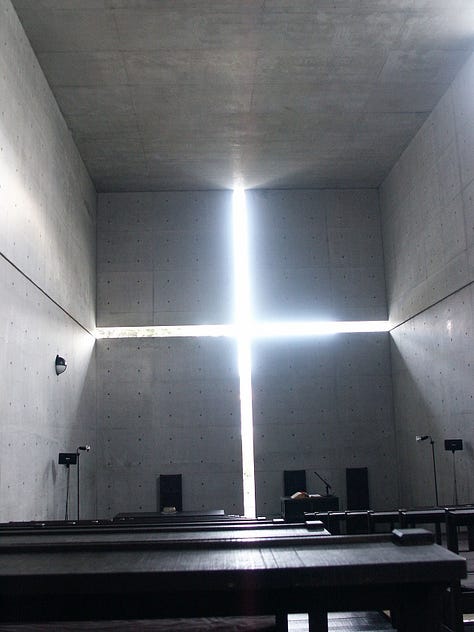
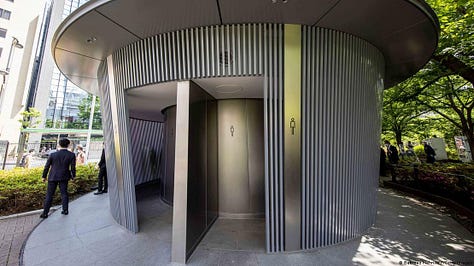
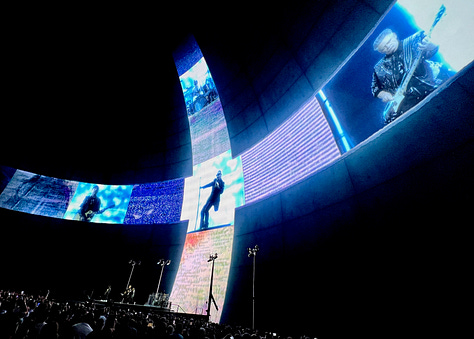
I have now watched the tale of Hirayama’s intoxicatingly simple life that belies a complex human experience just beneath the assiduously tidy surface more than three times in 24 hours. (The same thing happened the first time I saw Wenders’ Wings of Desire, a film I’ve watched more than almost any other. That film also features the kind of silence and stillness that contain multitudes.)
For the first half hour of the Perfect Days, we watch as Hirayama goes about the rituals of his daily life almost without saying a word. He awakens before dawn without the brutality of an alarm clock, folds his futon and duvet and puts them away in the corner of his spartan, if light-filled and cozy, flat with his small buckwheat pillow on top. He brushes his teeth, gently spritzes the maple saplings in small pots in an adjacent room, pulls on his bright blue work coveralls emblazoned with “THE TOKYO TOILET” in bold white letters on the back, and heads out his front door.
He stops in the threshold for a moment, allowing the gentle purple light of dawn to find his face, and he smiles. Then he closes his eyes and takes a deep breath, inhaling the scent of a new day and exhaling gratitude before dropping a few coins in an outdoor vending machine, retrieving a small can of iced coffee, and climbing behind the wheel of his work minivan.
Once inside, he reached into a console above his head and pulls out several cassette tapes in their cases, considers his options, and chooses the soundtrack for his ride to work. The first morning it’s The Animals and “House of the Rising Sun.”
Music is a sacrament, one that he partakes of with great care and joy. The film’s soundtrack (and the artists who give voice to it) are characters in the story as much as the ones who appear in the flesh.
At work, he is meticulous, throwing himself into the work of scrubbing toilets and wiping sinks with the kind of virtuosity and attention to detail of a great artist. When someone interrupts his work to use the facilities, he respectfully stops what he’s doing and waits outside, averting his eyes for the sake of their privacy, but holding the space with the kind of non-anxious presence that takes a lifetime to cultivate. He has pride in his work. No detail is to small or too gross. He’s never disgusted, he doesn’t complain. In fact, he says almost nothing at all, but his silence is not one of withholding or performative piety. It’s about something much deeper and eternal.
He is a creature of habit and those habits give him comfort, but not in a way that feels escapist or as if the structure is a means of managing an otherwise chaotic world that might overwhelm him. Rather, it’s the kind of routine that lends itself to creativity. Years ago, a writer friend told me that he had to work in a space that was almost empty and devoid of any whiff of disorder so that his mind had the freedom to wander and get weird if necessary without suffering from decision fatigue about quotidian trivialities such as which fork to use or where he put his car keys.
The order of Hirayama’s world is not a coping mechanism, it’s a grace he gives himself. It’s a mindful choice and it makes him happy. He has lunch in a nearby park where he sits beneath a canopy of trees and watches the play of light through the leaves and branches. He pulls out his cheap μ mju Olympus point-and-shoot 35 mm film camera from the 1990s from a pocket in his overalls and, without looking through the viewfinder, takes a picture or two before returning to his work in the toilets. When he finishes cleaning a commode, he takes a few seconds to appreciate the job he’s done, his expert handiwork. (He even employs a small mirror on an extendable arm to check spots in and around the toilet that no one else will see.)
He notices because he pays attention. He sees and cares about the details, where some say God dwells.
Hirayama’s routine continues into his off hours. On work nights he goes to the public baths to have a scrub and a soak in the spa before having dinner at a bar where he watches a little baseball. On his days off, he cleans his apartment, takes his small bag of dirty clothes to the laundromat, and while they’re running through the machines, he brings a roll of Holga 400 ISO black-and-white film (about $6 per roll) to a camera store to have it developed, buy a new roll, and pick up the prints from his last one, which he’ll inspect at home later. When he is unrushed, he’ll sort the photographs into shots of the trees he likes and shots of other things he likes and store them in metal boxes labeled with the month and year inside a tidy cupboard behind sliding rattan doors. The shots that didn’t come out or that he doesn’t like for whatever reason he calmly rips in half and throws away. Almost without judgment.
It’s a ritual. The structure and repetition create peace in his world. And that peace helps him emanate calmness and kindness to the world beyond his second-story flat.
Once a week, he stops at a used bookstore and chooses a paperback from the $1 rack and at the end of each day, he reads himself to sleep, putting the book and his reading glasses down next to the futon before turning off the light and drifting off. He sleeps soundly, dreaming in black-and-white—soft impressionistic images of light and shadow, glimpses of the past and snatches of expectations or hopes for the future neither he nor the audience can see clearly.
On his drives home from work, usually well before sunset, he again contemplates his sonic traveling companion and picks “Pale Blue Eyes” by The Velvet Underground, with Lou Reed riding shotgun. The next evening it’s “Redondo Beach” from Patti Smith’s seminal Horses album—a cassette that goes missing for a few days when unexpected (and uninvited) guests disrupt his normally sanguine evening commute.
But even this unwelcome turn of events is greeted by Hirayama’s contemplative gaze. It, too, is a sacrament. A sacrament of interruption.
One night he returns to his apartment block to discover his teenage niece, Niko, waiting for him. She’s run away from home. He welcomes her without caveat, gives her his bed, and sleeps contentedly if uncomfortably in a closet. In the morning, he resumes his routine trying not to disturb the teen asleep on his futon. She awakens and asks if she can come with him to work. Sure, he says, and she joins him on his rounds, watching carefully as he tackles his work scrubbing toilet bowls and the inner-workings of high-tech bidets with the gusto of Jackson Pollock standing in front of a blank canvas with a half-dozen pots of fresh paint.
They eat lunch on his park bench. She pulls out a camera of her own to snap a few photos and it’s the same model as his. “You gave it to me,” she reminds him. He pretends to remember and they both know he doesn’t.
At the weekend, they ride bicycles and navigate conversations where Hirayama speaks more than we’ve heard him in the rest of the other scenes put together. She loves her uncle and is fascinated by his simple, seemingly uncomplicated and happy life. When she asks whether the river under the bridge where they’ve stopped leads to the ocean, he says it does.
Niko: Wanna go?
Hirayama: Next time.
Niko: When’s that?
Hirayama: Next time is next time.
Niko: And when’s that exactly?
Hirayama: Next time is next time. Now is now.
Niko: Next time is next time. Now is now.
Then they repeat it in unison, a sing-song mantra for their journey home.
Earlier, Niko asks her uncle why he doesn’t get along with her mother. They’ve had a fight and she’s run away for the first time (but probably not the last).
“You and mom have nothing in common,” Niko tells him. “She said like, you and we live in a different world.”
“Might be true,” Hirayama says.
“Is it?” she says.
“The world is made up of many worlds. Some are connected and some are not.My world … and your mom’s are very different,” he says.
“What about my world? Which world am I in,” she asks.
When sacraments of interruption have wreaked minor havoc on his routine in the past, we’ve seen brief flashes of annoyance and even anger disrupt Hirayama’s placid demeanor. During this conversation with his niece, something else creeps in—it’s the outer edge of a pall that begins to encroach on the light in his life.
A few scenes later, when Niko’s mother turns up in her chauffeur-driven Merc saloon to collect her wayward daughter, the shadow grows larger and heavier.
“Do you really clean toilets?” his sister asks, struggling and failing to hide the contempt and shame she feels for the life Hirayama has chosen to live. We don’t know the circumstances that have led him to cleaning toilets and until that moment, I hadn’t fathomed that it might have been the end of a long, difficult road mostly because he derives so much joy and satisfaction from the work he does.
He looks people in the eye. He’s not ashamed of what he does. In fact, he’s proud of it. His are not the actions of a desperate man. They’re the habits of a grateful man.
When his sister and Kiko drive away, Hirayama weeps.
I found myself talking back to the screen at this point.
“Don’t let anyone steal your joy, man! Fuck that noise!”
How often do we allow people to show up in our lives uninvited and unannounced with their dump truck of shame and unload it on us?
He felt no shame until his sister foisted hers on him. And that’s not about him. It’s about her. The only thing he can control is what he does with the shame left on his doorstep, the same one where he greets most mornings with a deep breath, inhaling joy, exhaling peace.
Some sacraments of interruption are easier than others.
Happily, Hirayama finds his equilibrium again when another unexpected guest crosses his path and needs his help—his quiet, non-anxious presence, and his open-hearted wonder.
“If our shadows overlap, do they get darker?” the stranger asks.
Hirayama suggests they figure it for themselves on the spot, two middle-aged men playing “shadow tag” under a street lamp as if they were children. And for a moment, they are.
The film ends with Hirayama alone in his van having selected his sonic traveling companion: Nina Simone and her “Feeling Good” melancholic anthem.
Dragonfly out in the sun you know what I mean, don't you know?
Butterflies all havin' fun, you know what I mean…
As she sings, he smiles, but cracks begin to form around the edges. They start in his eyes, which can’t decide if they’re going to fill with tears or delight. Maybe it’s not an either/or situation. It’s a both-and.
Joy and sorrow. Gratitude and grief.
It's a new dawn
It's a new day
It's a new life for me
And I'm feeling good
This morning, I’m standing in a threshold. So much is about to change.
My partner and I spend much of our time these days talking about how we want to arrange our lives.
How does one design a life for maximum joy?
It seems to me that it begins with simplicity and doing small things with great love. By choosing to foment peace, by making mindful choices such as giving up fear and negative self-talk for Lent. By refusing to waste our limited life force on things beyond our control, on petty grievances, or the energy vampires who nurture them.
By paying attention.
By being in the now.
By looking for the light and looking at the shadows.
By taking the time to see people and nature. And by bowing in gratitude to both.
But wait, there’s more…
I created a playlist of the entire soundtrack (including Maki Asakawa’s version of “The House of the Rising Sun”) on Apple Music HERE.
And here’s the almost-complete (without Asakawa) soundtrack playlist on Spotify:
Thank you for your kindness, generosity of spirit, and patience as I navigate the liminal space of the first half of this year.
There is so much to tell and so many exciting adventures on the horizon that I can’t wait to share with you in this space.
Deep bows of gratitude to each of you holding space for me (and us).
Let us all be brave and kind. With others. With ourselves.
And please don’t forget that you haven’t met yet everyone you will love, and you haven’t met yet everyone who will love you.
Heaps of love from me,

